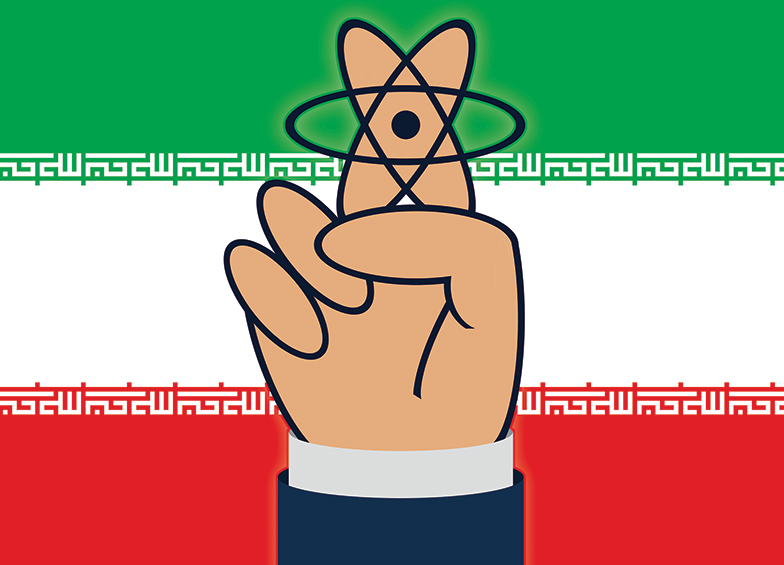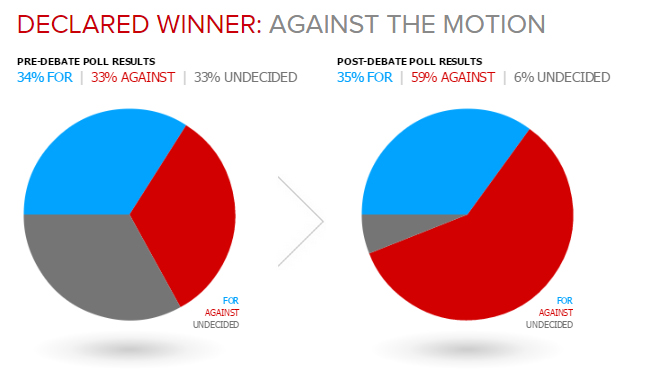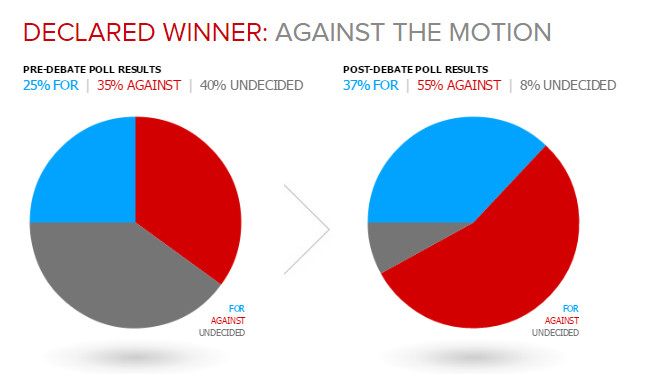Illustration by Thomas James for Intelligence Squared U.S.
In his recent piece in The Daily Beast “Obama’s Iran Nuke Deal: Winners & Losers,” Les Gelb’s overview of the recent Iran negotiations argues that “the emerging arrangements on Iranian nuclear programs announced Thursday are a clear plus/plus for both sides. Only those who don’t want any deal see it otherwise.”
The implication is that only ideologues will oppose the agreement. But is the matter that clear?
Since 2006, Intelligence Squared U.S. has presented three debates that trace America’s relations with Iran and its nuclear ambitions: In 2006, “We Must Tolerate A Nuclear Iran,” in 2009 “Diplomacy With Iran Is Going Nowhere,” and in 2013 “Israel Can Live With A Nuclear Iran.” Just this week we announced a debate on the current negotiations: “Obama’s Iran Deal Is Good for America.”
In 2006, our live audience reluctantly voted that we must, in fact, tolerate a nuclear Iran. By 2009, Iran had made huge strides in Uranium enrichment and the capability to build nuclear weapons. These developments all challenged vital U.S. interests. We debated not whether we should communicate with a hostile Iran, but what we should say.
Audiences were convinced: diplomacy with Iran is going somewhere. Where, you ask? We had to recognize that these developments are rational ways for Iran to enhance their own sense of security and to project their power and influence in their neighborhood. The official vote, below:
How could we plausibly induce Iran to change course? What costs can we threaten or impose? What inducements can we offer? And finally, what role should diplomacy have in this process? In 2012, the Iran debate progressed, this time with Israel at the heart of the matter.
We chose to debate about Israel because for the United States a nuclear Iran is a strategic setback, but for Israel it’s an actual existential threat. And because the stakes are so high for Israel, we felt the debate should focus on its decisions.
Iran has always had disturbing rhetoric, but they’ve never actually done anything that’s irrational or self-destructive, so that they can be deterred just like any other country from using those kinds of weapons. The counterargument would be that it doesn’t matter whether Iran uses nuclear weapons or not, the mere possession of them changes the game. In the end, audiences declared against the motion: Israel cannot actually live with a nuclear Iran. The results of that debate are as follows:
THE DEBATE TODAY
All of this brings us to our next debate: is Obama’s Iran deal good for the United States?
In one sense the deal not just about Iranian nukes. If Iran gets nuclear weapons, Egypt is not going to be far behind, and Turkey, and Saudi Arabia, and the last thing we need in terms of global security is a multi-nuclear Middle East. Iran is a revolutionary power, and if it has the protection of nuclear weapons there’s no telling what kind of provocations they will devise. They certainly would be unconstrained in providing more advanced missiles to Hezbollah. They could be more unconstrained in supporting Assad in Syria. So our stakes in disrupting the Iranian nuclear program are very high.
But will the deal we have negotiated actually do that? The Iranians have a disturbing history of cheating on prior agreements, and the inspection and verification regime we negotiated may have serious flaws. At best, the agreement will slow down their progress; but it seems to accept that ultimately they will gain the capacity to produce nuclear weapons.
And if the deal does indeed derail their nuclear program, it will do so at the cost of eliminating the sanctions. With sanctions gone, the lives of ordinary Iranian will improve dramatically, making the existing regime more secure domestically. And with a substantially stronger economy, they will be in a better position to dominate their neighbors through all manner of covert and overt political action and aggression.
Clearly Iran sees the deal it negotiated as in its interest. But is it in ours? Therein lies the debate.
The debate surrounding diplomacy continues on May 26th – join us live online here: Obama’s Iran Deal Is Good for America
–Robert Rosenkranz






